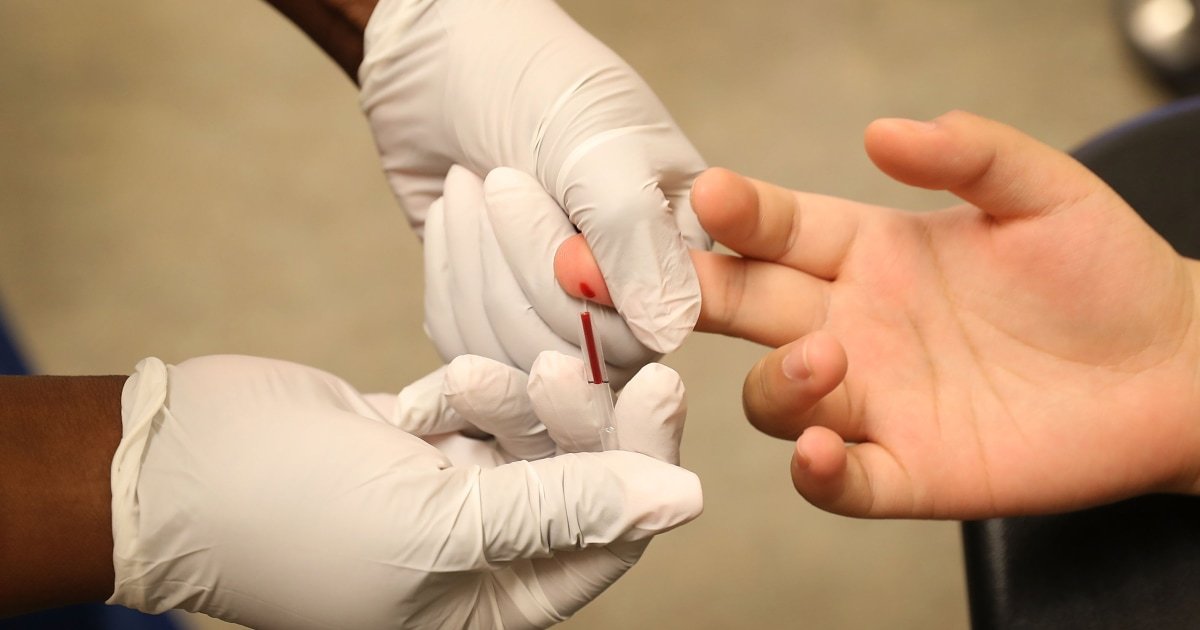The Food and Drug Administration has approved a highly effective new HIV-prevention medication, Gilead Sciences reported Wednesday. In clinical trials, the drug nearly eliminated HIV’s spread among people given an injection every six months.
Called lenacapavir, the highly effective drug has inspired feverish anticipation among advocates for HIV prevention. The hope is the medication could accelerate the stubbornly slow decline of HIV transmission in the United States.
“This is the single best opportunity in 44 years of HIV prevention,” said Mitchell Warren, executive director of the HIV advocacy nonprofit group AVAC.
Lenacapavir, which is given by health care workers in clinics, is significantly more effective than the existing oral HIV-prevention drugs, experts said, because it appears to address the challenges of sticking to a daily pill regimen for people who are at high risk of HIV.
Gilead’s chairman and CEO, Daniel O’Day, suggested in a statement Wednesday that lenacapavir could “end the HIV epidemic once and for all.”
Lenacapavir was approved after astounding results in Gilead’s large clinical trials of the drug. The trials randomly assigned people at risk of HIV to receive either lenacapavir injections every six months or daily Truvada, a pill form of pre-exposure prophylaxis, or PrEP. Among gay and bisexual men and transgender people, the lenacapavir group had an 89% lower HIV rate than a group taking Truvada and a 96% lower rate than Gilead estimated would have been expected absent any PrEP.
In a similar trial among cisgender women in sub-Saharan Africa, no one who received lenacapavir contracted HIV.
The drug the first in a new class of antiretrovirals which block HIV from infecting and making new copies of itself inside the immune cells it targets. Lenacapavir was first approved in 2022, under the brand name Sunleca, for use with other medications to treat highly drug resistant strains of the virus.
All forms of PrEP work in the same way: If enough of the drug is present in the body when a person is exposed to HIV, it’s highly effective at preventing the virus from taking hold and establishing a lifelong infection. Lenacapavir is so long-acting, it only needs to be injected twice a year.
However, lenacapavir’s use as PrEP against HIV emerges into a political climate that experts warn could derail progress against the virus’ spread. The Trump administration’s recent sweeping cancellations of research grants and its severe cuts to the Centers for Disease Control and Prevention’s staffing have dramatically affected the HIV-prevention field in particular. HIV experts are concerned that lenacapavir’s full potential might remain unrealized.
Lenacapavir’s cost could be another hurdle if health insurance companies don’t pay for the new drug.
Health insurers, at least in the near term, might decline to cover lenacapavir in favor of other forms of PrEP, including the cheaper generic version of Truvada pills, which cost as little as $30 per month. Or insurers might impose higher copays for lenacapavir, said Elizabeth Kaplan, director of health care access at Harvard Law School’s Health Law and Policy Clinic.
A pending Supreme Court decision concerning a pillar of the Affordable Care Act could also be a barrier to insurance coverage for medications that prevent HIV. The ACA, or Obamacare, mandates no-cost coverage for certain preventive interventions like PrEP.
Mixed success for PrEP drugs
Older forms of PrEP have had mixed success.
Truvada, also made by Gilead, was the first approved PrEP drug in 2012, followed by a similar oral medication from the company, Descovy, in 2019.
They have steadily gained popularity among gay and bisexual men, who, according to the CDC, account for 7 in 10 new HIV cases and comprise the overwhelming share of PrEP users.
However, considering how much higher the HIV rate is among Black and Latino gay men compared with their white peers, PrEP use among men of color has remained disproportionately low. Experts believe PrEP has most likely hastened HIV’s considerable decline among white gay and bisexual men, but the HIV rate among Black and Latino gay and bisexual men has persisted at markedly high rates. In addition, when they are prescribed PrEP, Black gay men are less likely to take the pill regimen as prescribed.
When they are taken daily, Truvada and Descovy each slash HIV risk by at least 99%. But inconsistent use diminishes PrEP’s effectiveness.
In late 2021, ViiV Healthcare’s Apretude was approved as an injectable PrEP given every two months.
Despite being much more effective than Truvada at lowering HIV cases across a population of gay and bisexual men and transgender women in a major clinical trial, Apretude has gained scant traction until recently. About 21,000 people are taking it, ViiV reported. It’s possible that, in part, people have been alienated by the requirement to visit a clinic every two months for Apretude, instead of every three months for an oral PrEP prescription.
Lenacapavir has the potential, but will it deliver?
Lenacapavir offers an alternative for people who won’t or have trouble remembering to take a pill every day, and it reduces the number of required annual clinic visits from four to two.
According to CDC estimates, during the decade after PrEP’s debut, the annual HIV transmission rate declined by only 17%, from 38,300 cases in 2012 to 31,800 cases in 2022. Much of the decline occurred since 2018, with case numbers falling by 12% during that four-year period.
In 2019, the Trump administration launched the Ending the HIV Epidemic, or EHE, initiative, which has since targeted nearly $3 billion in new spending to combat HIV, including by promoting PrEP, in 48 hot-spot counties in particular. The target jurisdictions had a swifter 21% decline in estimated HIV transmissions from 2018 to 2022.
In a study published in October, CDC investigators reported that PrEP use has risen steadily since 2014 and that about 200,000 people were receiving some form of it during any month of 2023.
But that is only a small fraction of the 1.5 million gay and bisexual men who are good PrEP candidates, according to estimates in a new CDC study published in May.
The crucial question is whether a critical mass of people who otherwise wouldn’t have stuck to an oral PrEP regimen can routinely be provided lenacapavir while they are at risk of HIV.
Dr. Susanne Doblecki-Lewis, chief of the division of infectious diseases at the University of Miami Miller School of Medicine, is the site principal investigator for the lenacapavir clinical trial in gay men and a separate trial in people who inject drugs. She said lenacapavir could mitigate HIV-related racial disparities, provided it is made “available easily and at low or no cost to people who can benefit from it who are uninsured or underinsured.”
But, she said, “if there are barriers, like complicated prior authorizations or high copays that will prevent people from easily starting it, we could see disparities just get worse.”
Political challenges
The Trump administration’s 2026 budget request seeks a $1.5 billion, or 35%, cut for domestic HIV funding. That includes shuttering the CDC’s $794 million HIV-prevention division, although some remnants of it are apparently meant to be folded into a new federal health department, along with a maintained $220 million in EHE funding.
Much of the CDC’s HIV-prevention and -surveillance budget is distributed in grants to state and local health departments and nonprofit organizations. Severe federal budget cuts would most likely hobble those entities’ efforts to educate at-risk populations and doctors about lenacapavir and provide services to facilitate its use.
Another hurdle for prescribers is whether they can ensure that people at risk of HIV return for lenacapavir shots twice yearly. Two recent studies, one published in May and another presented at a conference in March, found that fewer than half of oral PrEP users stay on it for six months or longer.
Historically, the National Institutes of Health has funded research to help implement new forms of PrEP, examining weak spots and devising interventions. But the Trump administration’s campaign to slash NIH spending has had a severe impact on HIV research, including PrEP, according to a dossier of canceled grants compiled by a Harvard researcher.
A federal judge ruled Monday that some such NIH grant terminations were “arbitrary and capricious” and “void and illegal.” But the temporary win for researchers doesn’t mean the NIH under Trump will necessarily become newly hospitable to grant proposals concerning PrEP implementation.
Johanna Mercier, Gilead’s chief commercial officer, said in an interview this month that the company has been pushing insurers to cover lenacapavir. She expressed optimism for ultimately widespread coverage of the drug.
Gilead will cover up to $7,200 annually in out-of-pocket costs for insured people receiving lenacapavir. And its patient assistance program will provide it free to low-income uninsured people. There is otherwise a patchwork system nationally that can often aid the uninsured in covering the required clinic visits and lab tests.
Tristan Schukraft, CEO of the popular PrEP-focused telehealth company Mistr, said it intends to begin offering lenacapavir immediately through its storefronts in seven major urban gay neighborhoods. The company has also formed partnerships with a nationwide network of community-based clinics that can provide the shots, including to people without insurance.
“We’re ready,” Schukraft said.
#lenacapavir



